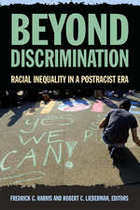
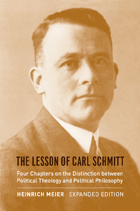
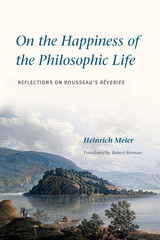
The first part of On the Happiness of the Philosophic Life approaches the Rêveries not as another autobiographical text in the tradition of the Confessions and the Dialogues, but as a reflection on the philosophic life and the distinctive happiness it provides. The second turns to a detailed analysis of a work referred to in the Rêveries, the “Profession of Faith of the Savoyard Vicar,” which triggered Rousseau’s political persecution when it was originally published as part of Émile. In his examination of this most controversial of Rousseau’s writings, which aims to lay the foundations for a successful nonphilosophic life, Meier brings to light the differences between natural religion as expressed by the Vicar and Rousseau’s natural theology. Together, the two reciprocally illuminating parts of this study provide an indispensable guide to Rousseau and to the understanding of the nature of the philosophic life.
“[A] dense but precise and enthralling analysis.”—New Yorker
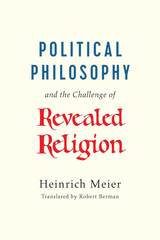
In the first of three chapters, Meier determines four intertwined moments constituting the concept of political philosophy as an articulated and internally dynamic whole. The following two chapters develop the concept through the interpretation of two masterpieces of political philosophy that have occupied Meier’s attention for more than thirty years: Leo Strauss’s Thoughts on Machiavelli and Jean-Jacques Rousseau’s Social Contract. Meier provides a detailed investigation of Thoughts on Machiavelli, with an appendix containing Strauss’s original manuscript headings for each of his paragraphs. Linking the problem of Socrates (the origin of political philosophy) with the problem of Machiavelli (the beginning of modern political philosophy), while placing between them the political and theological claims opposed to philosophy, Strauss’s most complex and controversial book proves to be, as Meier shows, the most astonishing treatise on the challenge of revealed religion. The final chapter, which offers a new interpretation of the Social Contract, demonstrates that Rousseau’s most famous work can be adequately understood only as a coherent political-philosophic response to theocracy in all its forms.
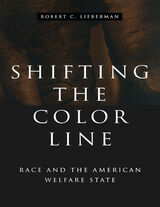
Despite the substantial economic and political strides that African-Americans have made in this century, welfare remains an issue that sharply divides Americans by race. Shifting the Color Line explores the historical and political roots of enduring racial conflict in American welfare policy, beginning with the New Deal.
Through Social Security and other social insurance programs, white workers were successfully integrated into a strong national welfare state. At the same time, African-Americans--then as now disproportionately poor--were relegated to the margins of the welfare state, through decentralized, often racist, public assistance programs.
Over the next generation, these institutional differences had fateful consequences for African-Americans and their integration into American politics. Owing to its strong national structure, Social Security quickly became the closest thing we have to a universal, color-blind social program. On the other hand, public assistance--especially Aid to Families with Dependent Children (AFDC)--continued to treat African-Americans badly, while remaining politically weak and institutionally decentralized.
Racial distinctions were thus built into the very structure of the American welfare state. By keeping poor blacks at arm's length while embracing white workers, national welfare policy helped to construct the contemporary political divisions--middle-class versus poor, suburb versus city, and white versus black--that define the urban underclass.
READERS
Browse our collection.
PUBLISHERS
See BiblioVault's publisher services.
STUDENT SERVICES
Files for college accessibility offices.
UChicago Accessibility Resources
home | accessibility | search | about | contact us
BiblioVault ® 2001 - 2024
The University of Chicago Press









